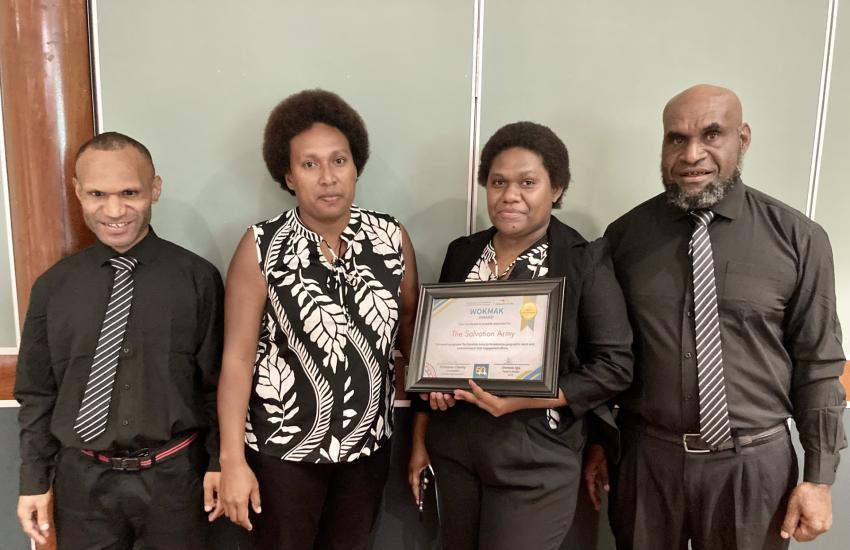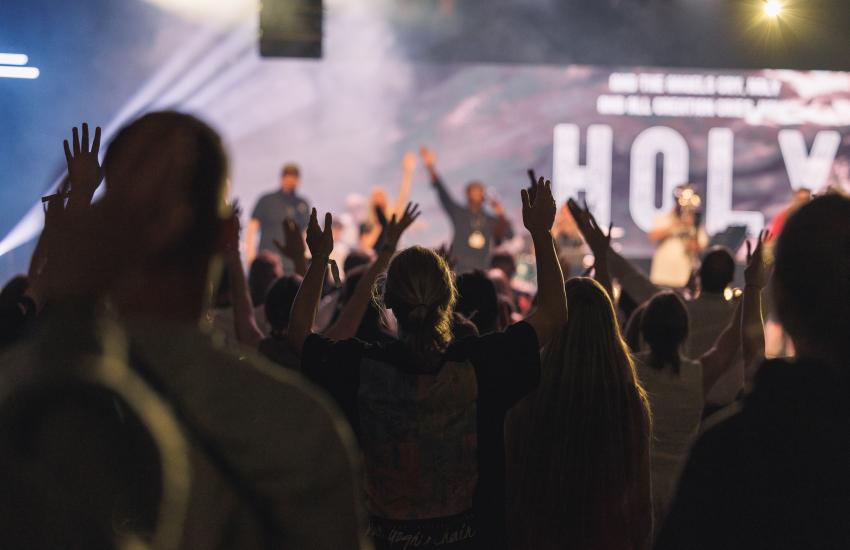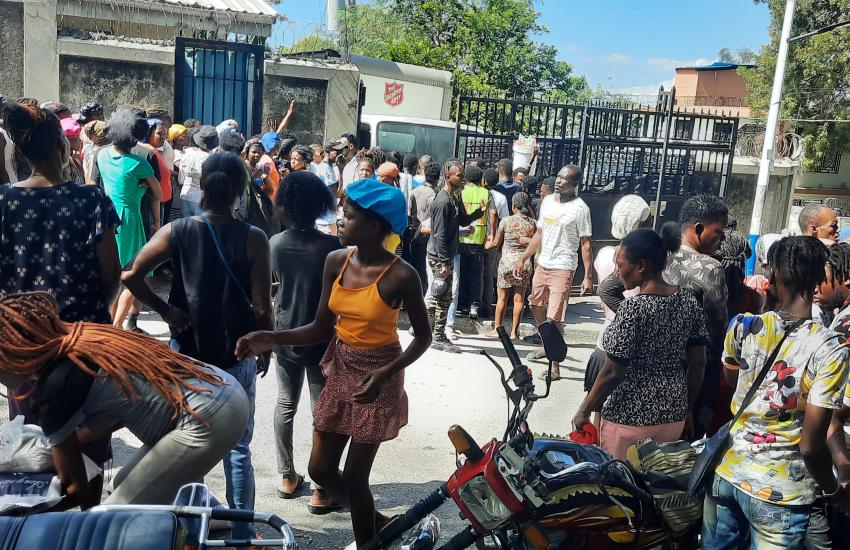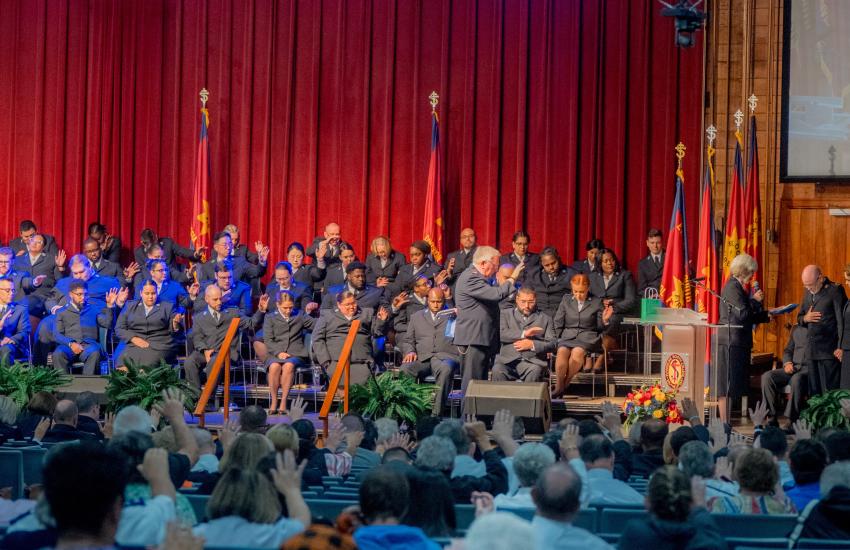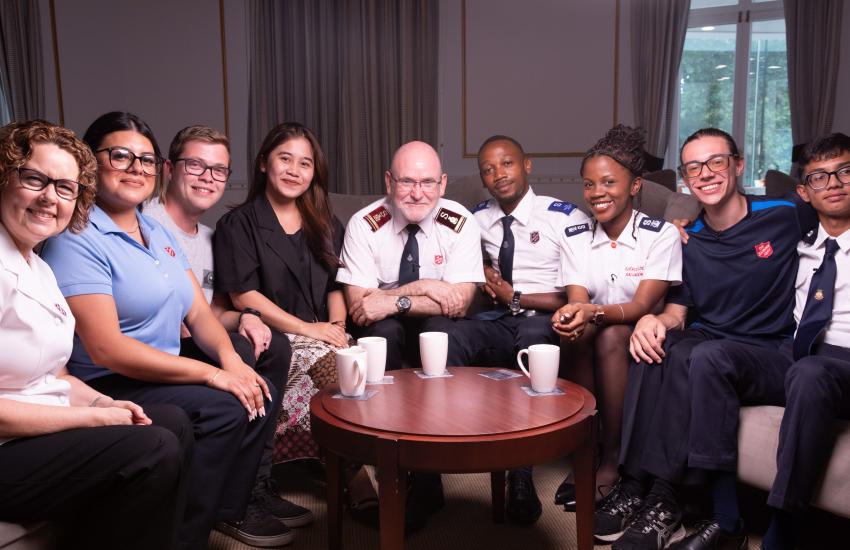THE visit of General André Cox and Commissioner Silvia Cox (World President of Women's Ministries) to Pakistan provided opportunities to share with the country's Salvationists and also to form relationships with local authorities and across faith divides.
The day after arriving in the country the General met with the Governor of Punjab, followed by a visit to the Badshahi Mosque. At territorial headquarters (THQ) the international leaders opened a new entrance and guard house. The General offered words of dedication before Commissioner Cox prayed for the Pakistan Territory and cut the ribbon. As the dedication stone was unveiled THQ echoed with the sounds of clapping and cheering.
The General spoke about the need for security and good boundary walls, but he added that The Salvation Army's doors should be open to those who are in need – physically and spiritually – and that its relationships with the community and other faiths should be strong. The day ended with a visit to the Lahore Girls Boarding Hostel.
The next day, Friday, the General and Commissioner Cox attended a youth rally. They were greeted with young people shouting: 'Hallelujah!' while waving the flags of Pakistan and The Salvation Army.
Drama items by young people from Islamabad and Khanewal brought interest before Commissioner Cox delivered a challenging Bible message. The congregation was asked to consider its faithfulness and obedience. Seventy-five young people went forward for prayer.
Later, at the training college, the cadets sang their sessional song and both the General and Commissioner Cox planted trees. The General told the cadets and officers that their attitude should be like that Jesus Christ, not looking after their own interests but considering the interests of others.
In the evening the international leaders visited Awan Dhyia Corps (church) in Lahore Division. They were escorted into the village by motorbikes carrying Salvation Army flags. Drums and dancing were the order for the night, as the visitors mingled with local Salvationists and friends.
On Saturday, 800 women gathered for a rally. The venue was full of colour, with an entrance that was decorated with mud pots, madhani (wooden butter maker), charkha (cotton wooden spinning machine) and other traditional accessories. Women dressed in traditional clothes represented their provinces and promoted Pakistani culture.
A young woman from Jarannwala Division testified that God had answered her prayers, bringing healing and allowing her to have a child. A powerful drama item about violence against women was presented by representatives from Lahore Division. In her Bible message Commissioner Cox reminded the women of God’s love for them and shared how God wants to transform their lives. Women of all ages moved to the mercy seat for prayer.
In the evening, Christian, Muslim and Sikh faith leaders gathered together for a meal and to share in conversation. The General acknowledged the importance of this event and said that the world needed to see and hear about harmonious relations like these within Pakistan.
In the Sunday morning Salvationists rally, Commissioner Cox commenced her Bible message by asking the question: 'What are those things that make us stray from our belief in God?' She assured her listeners that if they stand firm in Jesus they will receive his strength and the promise of eternal life if they remain in him.
During a time of prayer many people went forward to the place of prayer in acts of rededication.
At the second rally of the day the General challenged those present to allow Jesus to transform their lives. Again people were led by the Spirit to move forward and seek the transforming power of God in their lives.
On their final day in Pakistan the General and Commissioner Cox visited William Booth Street, at THQ, where officers and employees live. From there they shared in staff prayers and morning tea.
The remainder of the day was filled with visits. At the Manzil e Shifa (House of Healing) Physical Rehabilitation Centre a patient willingly told how The Salvation Army staff show love and care. A visit to Momanpura to see a Sally Ann (Trade for Hope) and BASSIC (Building Advanced Strong Sustainable Independent Communities) Programme was next on the agenda. Sally Ann products were shown to the visitors before the General presented some new sewing machines. Visits to a literacy centre and mother and child health club were also inspirational.
The international leaders' final visit was to Joyland Girls' Home, where residents presented flowers and performed a cultural stick dance.
